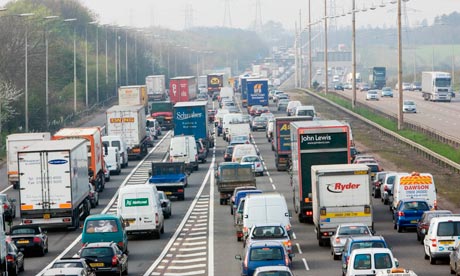
Successive governments have found that the simplest way to end urban poverty is to encourage poor people to live near congested roads. Apart from war and fags, nothing is more certain to shorten human life than to make people breathe a daily dose of poisons, especially sooty particles known as PM10s and nitrogen oxides that largely come from traffic and factories. The minute particles of partially burned diesel fuel and tyres travel deep into lungs and the gases trigger respiratory diseases. If you already have heart disease or asthma, then just living near a main road can be a death sentence.
In Britain, the environment audit committee has just produced a shocking report showing that 200,000 people can expect to have their lives shortened by as much as two years and everyone else have theirs curtailed by seven months for just breathing. In London alone, air pollution has been linked to nearly one in five deaths a year. This is in line with the rest of the US and Europe where last week the European Environment Agency [EEA] reported that air pollutants already lead to 500,000 premature deaths a year and are now a bigger killer than passive smoking, road traffic accidents and obesity together.
Of course no government needs to encourage the poor to live close to main roads. They already do. Pollution follows the poor just as assiduously as debt collectors. The worse the air, the poorer the people living in it. Where there is wealth you will mostly find clean air. The reason why west London is far richer than east? Because the wind mainly blows from the west, so the factories and the workers were last century put downwind in the east.
Little has changed since the 1950s, when thousands died annually from "pea souper" smogs caused largely by coal burning, except that you can barely see today's photochemical pollution from traffic. There are good EU laws and WHO guidelines on air pollution now, but successive central and local governments have not just failed to act, but continually tried to evade their legal responsibilities.
Back in the 1990s, Britain was given six years' notice to meet European laws, but like other countries it failed to meet its targets and since then has been trying to extend its time limits. Since 2005 it has been in flagrant breach of the law and last week it wrote to the European commission to say it expected London's pollution to remain over the legal limit for another decade or more. This means the government has deliberately sanctioned the mass poisoning of its own people for nearly 20 years. To add insult, it has just changed the rules to ensure that it can pass the £300m of fines it stands to incur every year for missing European standards on to local authorities.
Protestations that government is encouraging electric cars and needs more time to comply are rubbish. It's not as if air pollution is hard to control or even expensive. Most comes from mass car use, so a national network of low emissions zones could be set up within months. Fewer vehicles could be allowed into city centres. Government could spend on better cycling and pedestrian infrastructure.
As it is, air pollutants are bleeding the economy nearly as much as bankers. Europe, says the EEA, could be paying €537bn (£460bn) a year in human health terms for air pollution by 2020, and government estimates it costs Britain £20bn a year already. If you include crop damage, acidification, eutrophication of rivers and the impact on vegetation then the real costs of air pollution may rival or even exceed the cost of Britain going to war every year.
Yet it is not even in the business plan of the environment department and, because of an obsession with climate change, it has until very recently barely been on the agenda of national environment groups. Few politicians appear to understand the importance of the issue even though traffic volumes are predicted to rise by 14% over the next 10 years, and even fewer people make the link between air pollutants and climate change. Recent UN studies suggest that air pollution from cars, cooking stoves and factories may contribute as much as 25-30% to climate change emissions even as they kill up to 2.5 million people a year.
Instead, under the banner of its localism agenda, the government's response to Europe's biggest health crisis is breathtaking. It is dumping the problem on local authorities and putting off taking action, while behind the scenes it lobbies the EU to weaken limits and tries to create a legal loophole for inaction. How cynical can you get?

